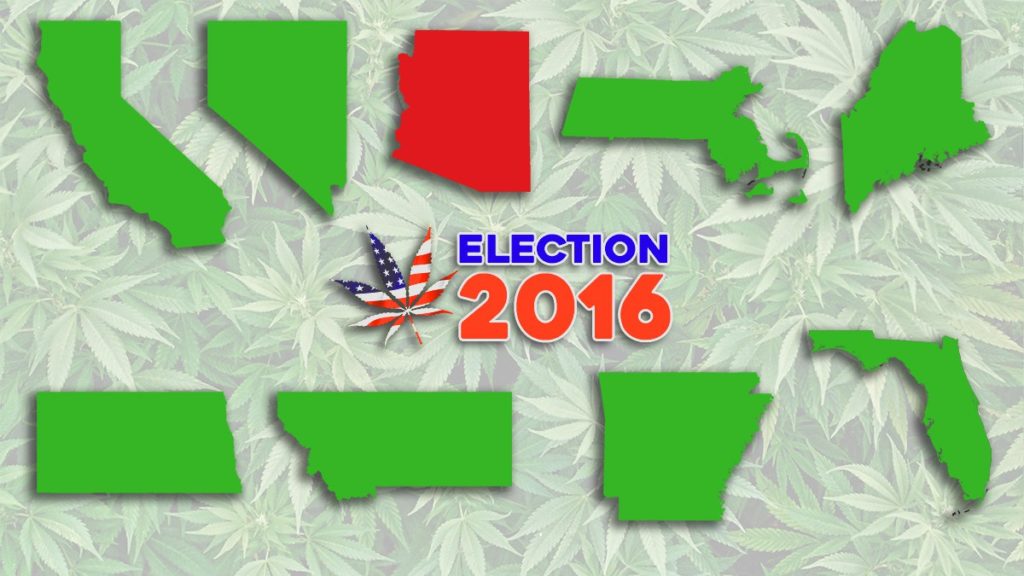Yesterday’s election was historic in many ways. The imminent change in federal administration may have repercussions for state-run legal marijuana regimes. Until now, states with legal marijuana regimes have been functioning under the protection of what’s called the “Cole Memo” – a document issued by the US Department of Justice, which directs federal prosecutors to use discretion in prosecuting marijuana-related crimes per eight enforcement priorities. While many believe that Hillary Clinton would have most likely maintained the status quo regarding the Cole Memo, President-Elect Donald Trump’s position is less clear. Look for future blog posts for more comprehensive analyses on this issue.
Yesterday’s election was a watershed moment for marijuana legalization among the states. Please see our summary of the results of marijuana initiatives.
Adult-Use Marijuana
Four states have legalized marijuana for adult-use, joining Alaska, Colorado, Oregon and Washington.
- Arizona (Failed) – The state electorate defeated Proposition 205 with a 52.1 percent “no” vote. It would have allowed adults to carry up to one ounce, grow up to six plants (12 total per household), and consume marijuana in private spaces. Retail marijuana sales were set to have a 15 percent tax imposed. Some Arizona residents expressed concern that decriminalization would not keep up with the new law. They pointed out that any possession of plants in excess of the limit could still have been charged as a felony.
- California (Passed) – Proposition 64 makes recreational marijuana legal all along the West Coast and many people argue will mark a path to federal legalization. Also known as the Adult Use of Marijuana Act, the law allows for adults to possess up to an ounce of cannabis and purchase dried flower and cannabis products from licensed retailers as well as grow six plants for personal use. Initial taxes imposed include a 15 percent excise tax on retail sales plus a cultivation tax per volume. Proponents estimate that the Act could result in $1 billion annually in state tax revenue. One major concern, however, is that large, well-funded investors will swallow up smaller family farmers formerly engaged in the state’s medical marijuana program. One LA-based private equity fund plans to deploy $75 -$100 million over the next few years to acquire property and build out cultivation centers and dispensaries in Southern California.
- Massachusetts (Passed) – Question 4 provides for adults to possess up to one ounce of marijuana, keep up to 10 ounces at home, and grow up to six plants. Marijuana sold by licensed retailers is subject to an excise tax of 3.75 percent in addition to the state’s 6.25 percent state sales tax. Some concern exists regarding the timetable to get the legal regime up and running. It took about 3 years for the first medical marijuana dispensary to open after passage of Massachusetts’ medical marijuana law. Some have also expressed worries that the 3.75 percent tax will fall short of the funds necessary to launch the state’s regulatory scheme which includes the creation of a cannabis control commission.
- Maine (Passed) – Question 1 allows people 21 years of age and older to use marijuana recreationally. The measure would permit each adult to grow up to six plants for personal use and would levy a 10 percent sales tax on retail marijuana and marijuana products while restricting use to private residences. Under the measure, municipalities could regulate the number of retail stores or ban them entirely. One concern voiced by legalization proponents is the state-wide cap on canopy space and language which designates 60 percent of licenses for large growers and only 40 percent for small growers.
- Nevada (Passed) – Question 2, also known as The Regulation and Taxation of Marijuana Act, expands moves already made by some Nevada counties to adopt medical marijuana regulations. The Act makes it legal for adults age 21 and over to purchase marijuana for recreational use, possess up to an ounce of marijuana, and grow up to six plants at home (if that residence is more than 25 miles from a licensed dispensary). Wholesale marijuana is subject to a 15 percent excise tax. Unlike Oregon, the Act limits the number of retail licenses by each county’s population. Counties with fewer than 55,000 residents could only have 2 retail establishments.
Medical Marijuana
Four states have joined the ranks of 25 states and the District of Columbia in passing or expanding some form of medical marijuana law (not including CBD-only laws):
- Arkansas (Passed) – Issue 6, also known as the Arkansas Medical Marijuana Amendment, is a constitutional amendment that allows an independent commission to grant licenses for up to eight grow facilities and 40 for-profit dispensaries statewide. It does not provide for home growing. A second measure, Issue 7, was disqualified by the Arkansas Supreme Court due to lack of compliance with registration and reporting laws for paid canvassers. This measure would have allowed for some home growing for patients who live more than 20 miles from a cannabis care center.
- Florida (Passed) – Amendment 2 provides for the state Department of Health to register and regulate dispensaries and issue ID cards to marijuana patients and caregivers. Individuals with medical conditions such as HIV/AIDS, epilepsy, multiple sclerosis, PTSD, and Crohn’s disease would be eligible for a card with approval from a licensed Florida physician. Because Florida’s demographics include 20 million residents, many of whom are seniors, baby boomers, and veterans, many see the passage of Amendment 2 as a lucrative business opportunity. One newly-formed venture capital firm is currently raising $15 million to fund various medical marijuana-related ventures.
- Montana (Passed) – Ballot Issue 14, also known as I-182, expands legal access to medical marijuana. It repeals the three-patient limit and other requirements like unannounced inspections and review for physicians who provide certifications. Newly added qualifying conditions include chronic pain and PTSD. The implementation of the law could be delayed for months because of an error written into the measure. The initiative aims to immediately repeal the three-patient limit, but the measure’s language indicates that the limit would not be lifted until June 30, 2017.
- North Dakota (Passed) – Initiated Statutory Measure No. 5 or The North Dakota Compassionate Care Act allows for the possession of up to 3 ounces of marijuana for conditions such as HIV/AIDS, cancer, epilepsy, and glaucoma. It also provides for patients who live more than 40 miles from a licensed dispensary to grow up to eight plants. The most vocal opponent to this measure was the North Dakota Medical Association. It claimed that the petition “would be very difficult to implement in a safe and cost-effective manner.”
While these results undeniably illustrate a broad movement by states across the nation to legalize marijuana use in some form, our experience in watching what it takes for an initiative to go from “passed” to fully-implemented suggests that there is a lot that can happen, and there may be more uncertainty regarding what will be required of the industry in each of the states (at least in the short term). We look forward to assisting our existing clients (as well as new ones) as they navigate the waters in these new markets.




